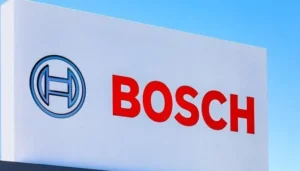German engineering and auto-parts giant Robert Bosch GmbH has announced plans to cut 13,000 jobs by 2030, primarily in its mobility division across Germany.
The move is part of a broader restructuring strategy aimed at addressing an annual cost gap of €2.5 billion ($2.93 billion) in its automotive business.
The job reductions will affect approximately 3% of Bosch’s global workforce and nearly 10% of its employees in Germany.
The company cited weak demand, rising operational costs, and intensifying competition from global players such as Tesla and China’s BYD as key drivers behind the decision.
Sites and Divisions Most Affected by Bosch Layoffs
The cuts will be concentrated in Bosch’s Power Solutions and Electrified Motion divisions.
Specific sites impacted include Feuerbach, Schwieberdingen, Waiblingen, Bühl, and Homburg—locations that have historically played a central role in Bosch’s automotive manufacturing operations.
- In Feuerbach, around 3,500 jobs will be eliminated, particularly in diesel component production and hydrogen technology.
- Schwieberdingen will see 1,750 positions cut due to weak orders and slow adoption of new technologies.
- Waiblingen’s 560-person plant, which produces connectors for the auto industry, is scheduled to close by 2028.
- Bühl, a hub for small electric drives, will lose approximately 1,550 jobs.
- Homburg, focused on diesel truck parts, will shed around 1,250 positions.
Bosch plans additional reductions across corporate functions, including administration, sales, and development.
Industry-Wide Pressures and Global Competition
Bosch’s announcement reflects broader challenges facing Germany’s auto sector.
The industry, which contributes nearly 6% to the country’s GDP and employs over 780,000 people directly, has been grappling with a sluggish European market, high energy costs, and demographic pressures that are driving up labor expenses.
The transition to electric vehicles (EVs) has also proven slower than anticipated.
Bosch, along with other automakers and suppliers, has invested heavily in electrification, but demand has not kept pace.
This has resulted in significant overcapacity, particularly in Europe.
“The shift to electromobility has not taken off as quickly as forecast,” said Marco Zehe, head of Electrified Motion at Bosch.
“That means we have lots of overcapacity, particularly in Europe and particularly in Germany”.
Trade Barriers and Tariff Impacts
Geopolitical developments and trade barriers have further complicated the landscape.
The company pointed to the impact of U.S. tariffs on European auto exports, introduced under President Donald Trump’s trade policy.
Although the current 15% duty rate is lower than some other tariffs, Bosch stated that it has added to costs and made it difficult to maintain its existing workforce levels.
Markus Heyn, Bosch board member and head of the Mobility division, noted, “Geopolitical developments and trade barriers such as tariffs lead to considerable uncertainty.
He added, “We expect competition to intensify further, so our goal is to seize growth opportunities wherever possible and position our Mobility sites worldwide for the future”.
Response from Bosch Leadership and Workers
Bosch’s management acknowledged the difficulty of the decision.
Stefan Grosch, board member and director of industrial relations, stated, “This is very painful for us, but unfortunately there is no way around it.
“We urgently need to work on our competitiveness in the mobility sector and continue to permanently reduce our costs,” he added.
Workers’ representatives have expressed concern, calling the scale of the layoffs “unprecedented” and pledging to resist the cuts.
The company began discussions with affected staff and will continually assess operations based on market developments and customer demand.
Note: We are also on WhatsApp, LinkedIn, and YouTube to get the latest news updates. Subscribe to our Channels. WhatsApp– Click Here, YouTube – Click Here, and LinkedIn– Click Here.



